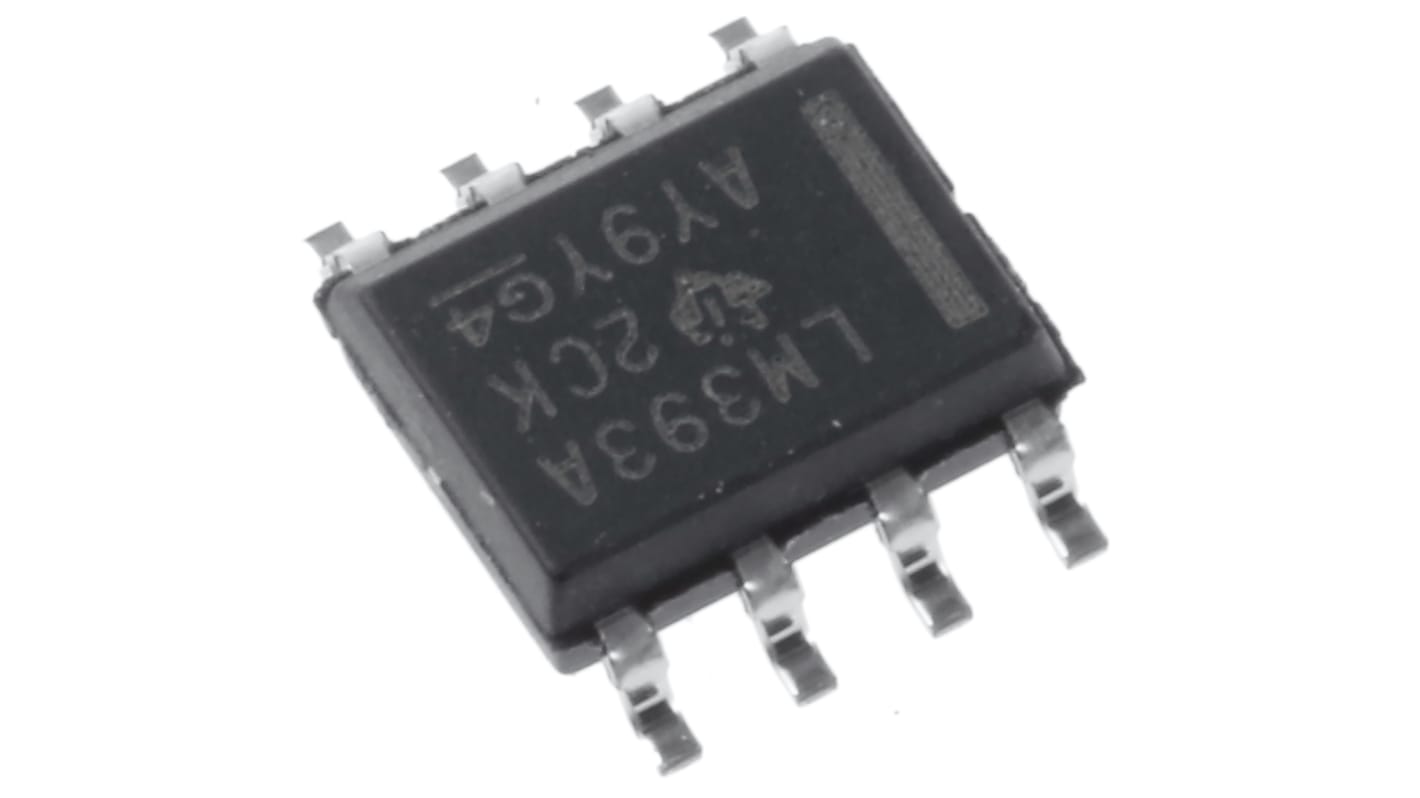LM393AD Texas Instruments 2-Channel Comparator Open Collector O/P, 1.3 μs 30 V 3 V 8-Pin SOIC
- RS Stock No.:
- 661-2810
- Mfr. Part No.:
- LM393AD
- Brand:
- Texas Instruments

Bulk discount available
Subtotal (1 pack of 10 units)*
£5.02
(exc. VAT)
£6.02
(inc. VAT)
FREE delivery for orders over £50.00
Temporarily out of stock
- 610 unit(s) shipping from 12 March 2026
Need more? Click ‘Check delivery dates’ to find extra stock and lead times.
Units | Per unit | Per Pack* |
|---|---|---|
| 10 - 90 | £0.502 | £5.02 |
| 100 - 190 | £0.488 | £4.88 |
| 200 - 390 | £0.475 | £4.75 |
| 400 - 790 | £0.463 | £4.63 |
| 800 + | £0.452 | £4.52 |
*price indicative
- RS Stock No.:
- 661-2810
- Mfr. Part No.:
- LM393AD
- Brand:
- Texas Instruments
Specifications
Technical Reference
Legislation and Compliance
Product Details
Find similar products by selecting one or more attributes.
Select all | Attribute | Value |
|---|---|---|
| Brand | Texas Instruments | |
| Product Type | Comparator | |
| Comparator Type | General Purpose | |
| Mount Type | Surface | |
| Package Type | SOIC | |
| Output Type | Open Collector | |
| Number of Channels | 2 | |
| Typical Response Time | 1.3μs | |
| Pin Count | 8 | |
| Minimum Supply Voltage | 3V | |
| Maximum Supply Voltage | 30V | |
| Minimum Operating Temperature | 0°C | |
| Maximum Operating Temperature | 70°C | |
| Length | 4.9mm | |
| Width | 3.91 mm | |
| Series | LM | |
| Height | 1.58mm | |
| Standards/Approvals | No | |
| Supply Current | 2.5mA | |
| Automotive Standard | No | |
| Select all | ||
|---|---|---|
Brand Texas Instruments | ||
Product Type Comparator | ||
Comparator Type General Purpose | ||
Mount Type Surface | ||
Package Type SOIC | ||
Output Type Open Collector | ||
Number of Channels 2 | ||
Typical Response Time 1.3μs | ||
Pin Count 8 | ||
Minimum Supply Voltage 3V | ||
Maximum Supply Voltage 30V | ||
Minimum Operating Temperature 0°C | ||
Maximum Operating Temperature 70°C | ||
Length 4.9mm | ||
Width 3.91 mm | ||
Series LM | ||
Height 1.58mm | ||
Standards/Approvals No | ||
Supply Current 2.5mA | ||
Automotive Standard No | ||
LMx93/LM2903 family Dual Comparators
The Texas Instruments LM193, LM293, LM393 and LM2903 are dual differential input voltage comparators designed to operate from a single power supply over a wide range of voltages. The common mode input voltage range includes ground and the devices have open collector outputs.
Comparators, Texas Instruments
Texas Instruments’ range of voltage comparators includes not only conventional single, dual and quad comparator packages but also window comparators and over- & under-voltage supervisors.
Although comparators and operational amplifiers are superficially similar devices their operation in practical applications is very different. Op amps are intended for linear operation accompanied by suitable feedback whereas comparators are tailored for rapid switching and generally operated in open-loop mode. Dedicated voltage comparators have significantly shorter propagation delays and are capable of faster response times under saturated conditions. Most comparators are also more tolerant of high differential input voltages and many have open-collector outputs allowing parallel operation with other devices.
Related links
- Texas Instruments 2-Channel Comparator Open Collector O/P, 1.3 μs 30 V 3 V 8-Pin SOIC
- LM293AD Texas Instruments 2-Channel Comparator Open Collector O/P, 1.3 μs 30 V 3 V 8-Pin SOIC
- LM2903D Texas Instruments 2-Channel Comparator Open Collector O/P, 1.3 μs 30 V 3 V 8-Pin SOIC
- LM393DR Texas Instruments 2-Channel Comparator Open Collector O/P, 1.3 μs 30 V 3 V 8-Pin SOIC
- Texas Instruments 2-Channel Comparator Open Collector O/P, 4 μs 15 V 15 V 8-Pin SOIC
- LM393D Texas Instruments 2-Channel Comparator Open Collector O/P, 1.3 μs 30 V 3 V 8-Pin SOIC
- LM393MX/NOPB Texas Instruments 2-Channel Comparator Open Collector O/P, 1.3 μs 36 V 2 V 8-Pin SOIC
- Texas Instruments 2-Channel Comparator Open Collector O/P, 1.3 μs 36 V 2 V 8-Pin SOIC
